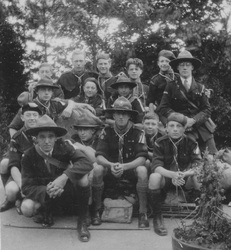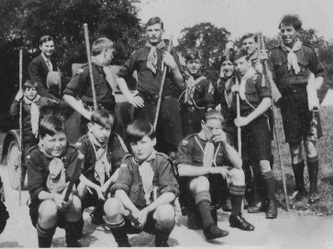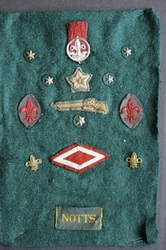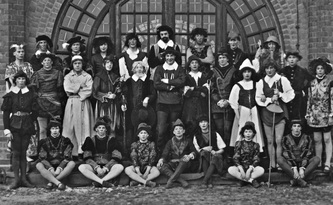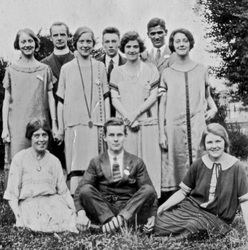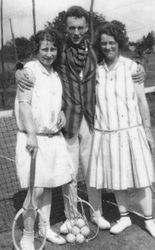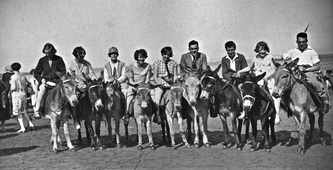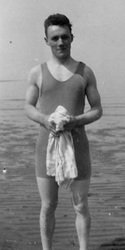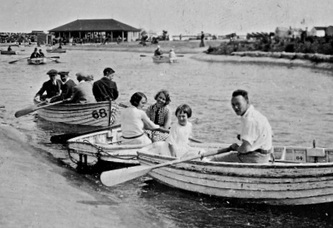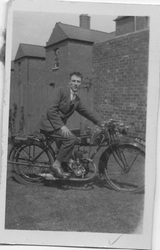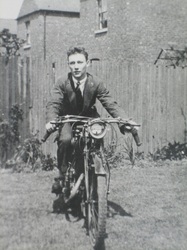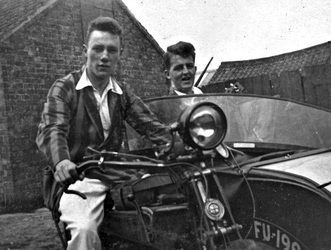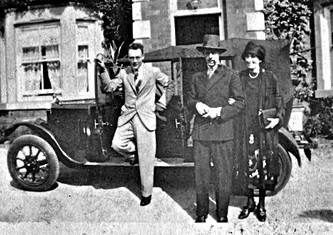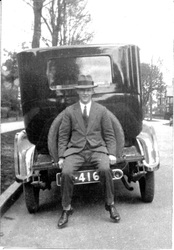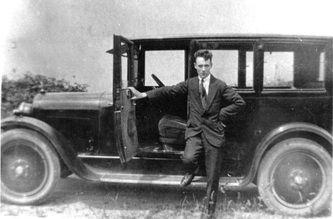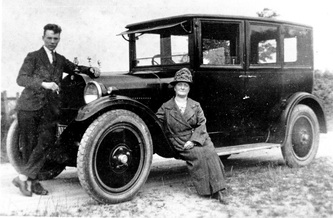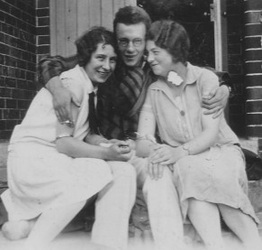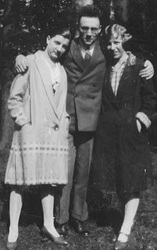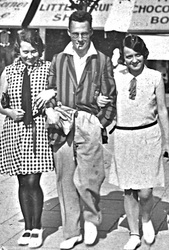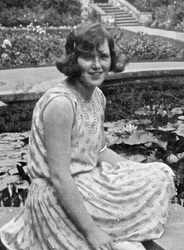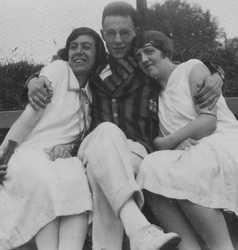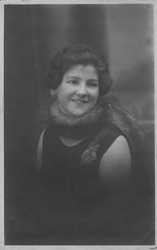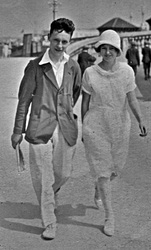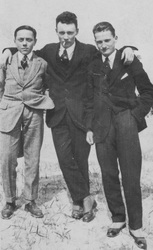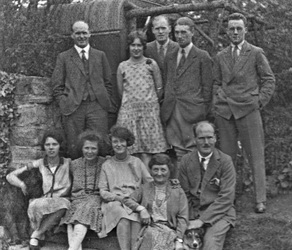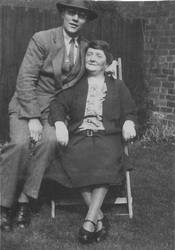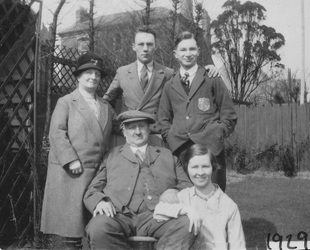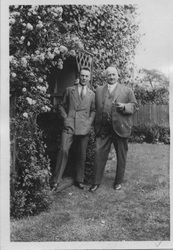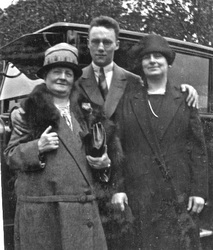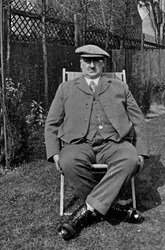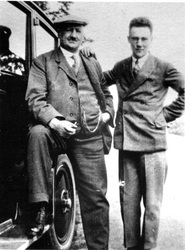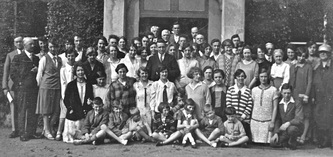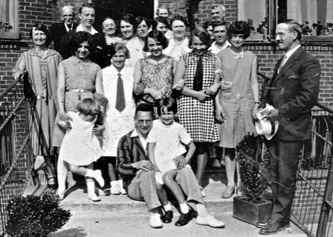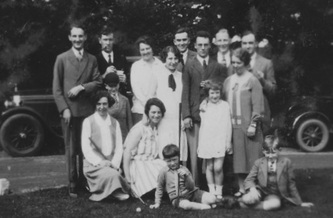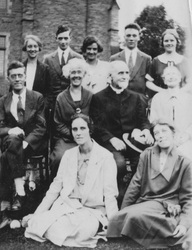The First Guard, Worksop Contingent, Strensall O.T.C. Camp - 1922 - Charles 2nd from right with bugle.
Three - Charles' Activities in England
Charles was always very active. Of course, it is impossible to know about everything he did, but the range of his known activities was quite wide.
Rugby was a favourite sport of his to which he was introduced while at Worksop College. By his last year at the school he had made the school team, so he pleaded with his father to let him take another year of studies, which would have allowed him the opportunity to participate further. But his father, who had not had any experience with team games, nor any advanced education, had other plans for him. This turned out to be a big mistake as he learned to his sorrow when Charles rebelled and went to Canada.
When Charles reached Canada and found out that the players in American and Canadian football use large pads to protect parts of their bodies, he was most scornful. He was fond of contrasting the American game with rugby in which the players use no pads at all. And his mind was quite closed on this matter. No amount of explaining the differences between the two games would change his mind.
Cricket – Charles played cricket at school, and continued to participate in it after leaving school. In fact he contrasted cricket to baseball, which was another sport which he held in low regard. After all, cricket players play with a ball every bit as hard and fast as a baseball, but the players don't use any form of protection on their hands resembling a baseball glove. Instead all their catching is done with their bare hands. Once again when hearing the reasons the use of the gloves was necessary in baseball, his mind was closed on the subject.
Field Hockey –While there is no indication that he played field hockey while he was in school, he used to relate how he had played on a mixed field hockey team after he left school. It was kind of a social group centered on field hockey as an activity. They played similarly constituted teams from nearby towns, probably quite informally.
Drama – Shakespeare: His school regularly put on Shakespearean plays. I have a photo of a cast in their costumes, but Charles does not seem to be among them. Perhaps he was away on the day of the photo. But he would often quote lines from the play so it's likely he somehow participated.
And, after coming to Canada, he retained his interest in theatric activities. Peter can remember that when as a small boy - about four years old, in Hazelton, being taken one evening to see a play that Charles was in. Charles and his friends had formed a local theatre group for the purpose of performing short plays. So, one evening they got Peter out of bed and took him to one of the plays so he could see his father acting. Peter can still remember feeling very worried about Charles when he saw him arguing with and being pushed about by one of the other actors.
Church camps – As a young man in England, one of the activities he did, which was part of his church worship, and which rose out of his genuine enthusiasm for the church and his relationship with God, was to attend church camps, as well as being involved in a variety of other activities that the young people of his church were doing.
Tennis – When Peter and Ann were young he used to have two or three tennis racquets hanging on a rack at home. But they never saw him use them. As far as they were aware he hadn't played tennis after coming to Canada, or if he did, it wasn't when they were around. Beside his racquets, the only evidence there is of his being involved in tennis are several photos from his English past of he and his friends, holding tennis racquets and dressed in sporting-looking clothes in surroundings that appeared as if they were adjacent to the seaside.
Trips to the seaside: He and his friends made numerous visits to a variety of resort towns, called seaside places, where they engaged in a variety of activities – donkey riding, rowboat rentals, tennis, among others.
Cycling - Bikes to Motorcycles
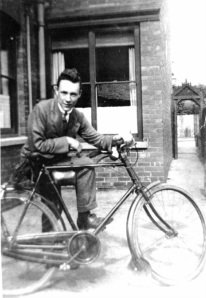
Charles with one of his bicycles.
Bicycles - During his boyhood Charles had a series of bicycles which he rode everywhere he went. As he got older, he and his friends would go on longer day trips, out across the countryside, which in that region is quite flat – out to the coast of Lincolnshire, or into Sherwood Forest, or to any one of a number of other destinations. He used to mention their travels along the “Great North Road”, much of the route that is now renamed the A1, which had been the coaching route once used by mail coaches travelling between London, York and Edinburgh.
Motorcycles
Motorcycles - When he was old enough his father bought him the first of a series of motorbikes and motorcycles. He used to talk about owning a BSA and then a Norton, but he probably had others. And after he had ridden a particular motorcycle for a time his father would say, “So-and-so (one of their employees) finds it hard to get to work. Why don’t you give him that motorbike and we’ll get you another one!” So he would give the employee his motorcycle and his father would buy him another and usually bigger cycle! This happened several times!
Motorcars:
Motorcars - Eventually, after he had gone through several motorcycles, his father bought him a car, which was the first of several, probably for the same reason as he had a series of motorcycles. The car which is prominent in the photos we have of him in that phase of his life appeared to be a Standard or a Star.
Charles in the Officer Training Corps (OTC)
Bugler in the OTC – While still at Worksop College, and in the group photos with his fellow cadets, he is always shown holding a trumpet. Before the army had walkie-talkies to facilitate communications on the battle-field, the trumpeter was an important part of a military company. Directed by the officer in command, the bugler would play a certain pattern of notes, or "call", as a signal to advance or move to the left, etc., which was the way that the officer could communicate with his men in the heat of a battle.
But a bugle was used for much more than that. Before PA systems or loudhailers were available to be used for making announcements or giving general commands, the bugler would be used to announce scheduled and certain non-scheduled events on a military base or battlefield. Bugle calls typically also called out the times for events in the routines while at camp.
Charles had learned all the calls that they needed to operate their camps efficiently, and he was proud of having achieved the designation of “Silver Bugler”.
Although he was getting military experience in the Office Training Corps, he was not in this corps long enough to have risen above the rank of Private. However, he enjoyed a variety of activities with the group, including marching, rifle range activities, and summer camps.
But a bugle was used for much more than that. Before PA systems or loudhailers were available to be used for making announcements or giving general commands, the bugler would be used to announce scheduled and certain non-scheduled events on a military base or battlefield. Bugle calls typically also called out the times for events in the routines while at camp.
Charles had learned all the calls that they needed to operate their camps efficiently, and he was proud of having achieved the designation of “Silver Bugler”.
Although he was getting military experience in the Office Training Corps, he was not in this corps long enough to have risen above the rank of Private. However, he enjoyed a variety of activities with the group, including marching, rifle range activities, and summer camps.
Charles' relations with others
In the days after he had left school, in the period when he was working in the store, and before he came to Canada, Charles had quite an active social life, It was a life which had its own dress code, which for his social group could require being quite dressed up for some events, each social function having its own requirements.
When Peter was in England, visiting his Aunt Margery, she told him a story of Charles stepping out one night for an evening’s social enjoyment. He was all dressed up and ready to call on one of his young lady friends, when, as he walked along the street, a fellow, dressed in his work clothing taunted him with, “Nyaah! Look at the sissy (or words to that effect) dressed up like a bleedin ‘ toff!”
Immediately Charles walked over to the rude fellow and hauled off and punching him right on his nose, knocked him down. He may have been dressed up, but he wasn’t going to be called a toff! It seems that the one punch took the fight out of the offensive fellow!
But actually, Charles was a very social person. His relationship with most people was friendly and easy-going, confident, open and trusting. In other words he related to many people easily. He had many friends from his many activities in groups – school, church, scouts, mixed sports, and others. And most significant in the photos that have come from his English days were the number of young ladies with whom he appears in the pictures, and who, after he moved to Canada, sent him pictures of themselves . Some appear in several photos, some only once, but generally they have one thing in common – they are all attractive young women and in the photos they all appear warm and friendly towards this young man. One would be led to conclude that he had little or no trouble in attracting young women who may or may not have had romantic intentions.
From accounts, Charles enjoyed the company of his lady friends for they did a variety of things together, including walking out, sports such as field hockey or tennis, attending the young people’s group in church activities, pursuing various seaside activities, and no doubt, other activities. Of these photos, at least one was sent by his parents who had passed it on for a very attractive young woman, all dressed up in a borrowed bridesmaid's dress(!), with the inference that “she would very much like you to return to England!!”
When Peter was in England, visiting his Aunt Margery, she told him a story of Charles stepping out one night for an evening’s social enjoyment. He was all dressed up and ready to call on one of his young lady friends, when, as he walked along the street, a fellow, dressed in his work clothing taunted him with, “Nyaah! Look at the sissy (or words to that effect) dressed up like a bleedin ‘ toff!”
Immediately Charles walked over to the rude fellow and hauled off and punching him right on his nose, knocked him down. He may have been dressed up, but he wasn’t going to be called a toff! It seems that the one punch took the fight out of the offensive fellow!
But actually, Charles was a very social person. His relationship with most people was friendly and easy-going, confident, open and trusting. In other words he related to many people easily. He had many friends from his many activities in groups – school, church, scouts, mixed sports, and others. And most significant in the photos that have come from his English days were the number of young ladies with whom he appears in the pictures, and who, after he moved to Canada, sent him pictures of themselves . Some appear in several photos, some only once, but generally they have one thing in common – they are all attractive young women and in the photos they all appear warm and friendly towards this young man. One would be led to conclude that he had little or no trouble in attracting young women who may or may not have had romantic intentions.
From accounts, Charles enjoyed the company of his lady friends for they did a variety of things together, including walking out, sports such as field hockey or tennis, attending the young people’s group in church activities, pursuing various seaside activities, and no doubt, other activities. Of these photos, at least one was sent by his parents who had passed it on for a very attractive young woman, all dressed up in a borrowed bridesmaid's dress(!), with the inference that “she would very much like you to return to England!!”
Charles' relatives
In those days families were often large, and thus extended families even more so. However, because Ebby had moved away from Chesterfield, and the lifestyle they lived was quite different from many of their cousins, the family never seemed to see very much of them. A few Botham relatives would occasionally appear – often to borrow money from Ebby who was quite generous with them. They would leave, and that often was the extent of their visit. In actual fact they were closer with their mother's family. Most of these lived in the Preston-Lytham area, north of Liverpool, so those were the family members they were closest to and with which they communicated more frequently. Although Charles became a good friend of Billy (William Colledge) Botham, son of Joseph, the auctioneer, and Frank (Francis Royston), son of Wiliiam (William Archdale), some of his other cousins he seems to have barely known.
Annie Jane, who had been orphaned – her father probably died soon after she was born, and her mother dying, it seems, when she was about 21 - had lived with her mother with two maiden aunts, Lily and Grace Singleton, sisters of Mary her mother, and periodically visited these aunts until they died. A third aunt, Elizabeth, married a Mr. Robert Shaw Simpson who became the Mayor of Preston, and achieved a position in that town of some prestige.
Although Annie Jane had been born in Preston, she had lived with her aunts in nearby Lytham-St. Anne’s, located on the coast near Blackpool. These aunts had seen that she attended the Church of England, was sent to a private school, and had generally provided her mother and herself with a good home. And, while Charles was still young he often went with his mother when she went to visit them. Eventually, when he was out of school and working with his father, he would drive to the seaside himself, taking a group of friends with him, , and they would enjoy the benefits of the seaside. We are not told where they stayed when they were there. Perhaps his outings were mainly day trips, and they would return home in the evening.
Annie Jane’s upbringing had instilled in her a code of personal conduct characteristic of the middle and upper middle classes. According to Charles, his mother was very fearful of public embarrassment so she insisted not only in being faultlessly dressed, but even her under-clothing had to be pristine. “What if I was to collapse, or if I was to be knocked over by a car in the street!” was one of her justifications. “If the doctor or even someone else was to see old or tattered undergarments, I should be so mortified!”
After two years at Worksop College, his father, who of course had not had much schooling himself, declared that Charles had spent enough time at school, and had learned enough for what he was going to do. His plan for Charles was that he should join the family firm and learn all about it by working in every department. This program would equip him for eventually taking it over. Thus Charles left his school and went to work for Eyre’s. This happened about 1922 when the country was in the middle of a post-war (WWI) recession, so it was possible that Ebby could have been trying to avoid the expense of continuing Charles' education.
Annie Jane, who had been orphaned – her father probably died soon after she was born, and her mother dying, it seems, when she was about 21 - had lived with her mother with two maiden aunts, Lily and Grace Singleton, sisters of Mary her mother, and periodically visited these aunts until they died. A third aunt, Elizabeth, married a Mr. Robert Shaw Simpson who became the Mayor of Preston, and achieved a position in that town of some prestige.
Although Annie Jane had been born in Preston, she had lived with her aunts in nearby Lytham-St. Anne’s, located on the coast near Blackpool. These aunts had seen that she attended the Church of England, was sent to a private school, and had generally provided her mother and herself with a good home. And, while Charles was still young he often went with his mother when she went to visit them. Eventually, when he was out of school and working with his father, he would drive to the seaside himself, taking a group of friends with him, , and they would enjoy the benefits of the seaside. We are not told where they stayed when they were there. Perhaps his outings were mainly day trips, and they would return home in the evening.
Annie Jane’s upbringing had instilled in her a code of personal conduct characteristic of the middle and upper middle classes. According to Charles, his mother was very fearful of public embarrassment so she insisted not only in being faultlessly dressed, but even her under-clothing had to be pristine. “What if I was to collapse, or if I was to be knocked over by a car in the street!” was one of her justifications. “If the doctor or even someone else was to see old or tattered undergarments, I should be so mortified!”
After two years at Worksop College, his father, who of course had not had much schooling himself, declared that Charles had spent enough time at school, and had learned enough for what he was going to do. His plan for Charles was that he should join the family firm and learn all about it by working in every department. This program would equip him for eventually taking it over. Thus Charles left his school and went to work for Eyre’s. This happened about 1922 when the country was in the middle of a post-war (WWI) recession, so it was possible that Ebby could have been trying to avoid the expense of continuing Charles' education.
Working at Eyre's:
Charles worked at Eyre's for approximately six years. But, when one is the age of "two-and-twenty", how patient are you? In fact he never was very patient. And Eyres did not offer what he wanted. In fact what he really wanted to do, and this must have really caused his father to think he was not only immature and unrealistic, but totally misguided, was to be the leader of a dance band. That is, he wanted to form his own band and play for dances and audiences, perhaps becoming quite prominent in the popular music of the day. He continued to practise his musical activities – playing the piano, the ukulele, banjo, and probably others. He may even have played at musical events. For the times he was "with it!" or hip, or "cool", playing all the latest tunes from London and New York. He could have had what he would have considered, a wonderful career at this activity!
Charles also stayed active in youth activities in the Wesleyan Methodist Church. In fact, he seriously considered the ministry as a career, where he would have become a pastor.
Charles worked at Eyre's for approximately six years. But, when one is the age of "two-and-twenty", how patient are you? In fact he never was very patient. And Eyres did not offer what he wanted. In fact what he really wanted to do, and this must have really caused his father to think he was not only immature and unrealistic, but totally misguided, was to be the leader of a dance band. That is, he wanted to form his own band and play for dances and audiences, perhaps becoming quite prominent in the popular music of the day. He continued to practise his musical activities – playing the piano, the ukulele, banjo, and probably others. He may even have played at musical events. For the times he was "with it!" or hip, or "cool", playing all the latest tunes from London and New York. He could have had what he would have considered, a wonderful career at this activity!
Charles also stayed active in youth activities in the Wesleyan Methodist Church. In fact, he seriously considered the ministry as a career, where he would have become a pastor.
It should also be noted that one of Charles' very strong interests was to work in his workshop, "tinkering" and creating new items particularly from metal. In fact, in Canada, whenever he moved to a new location, setting up his workshop was one of the first things he did. And in his workshop he could make almost anything out of whatever material he had at hand. Starting when he was very young and continuing throughout his life, he built up a great collection of tools which he later took to Canada. A few of the tools had been his father’s when he was apprenticing to be a cabinetmaker, but he seems to have collected most of them from a variety of sources.
However, his father wouldn’t hear or allow any of Charles’ own ideas for his life, so, when one of the fellows he had been in school with, Melvin Huby, came up with an idea for a venture in Canada which in the context of the times seemed like a very good one – he considered it and decided in favour of it.
When he told his family of his plans his father was furious! He stated most emphatically that Charles was missing out on the best thing he could do with his life! The discussion became very heated, they “had words”, as the English saying goes. But Charles prevailed, and though he was sorry to be parting on these terms, he prepared for his new life and packed what he thought he would need. His ticket cost $33.55.
On his day of departure the family went to Liverpool to see him off. Margery told Peter years later that as the boat pulled out her Father said, “We will never see Charles again!” Predictive words, sad words, for they became true!
However, his father wouldn’t hear or allow any of Charles’ own ideas for his life, so, when one of the fellows he had been in school with, Melvin Huby, came up with an idea for a venture in Canada which in the context of the times seemed like a very good one – he considered it and decided in favour of it.
When he told his family of his plans his father was furious! He stated most emphatically that Charles was missing out on the best thing he could do with his life! The discussion became very heated, they “had words”, as the English saying goes. But Charles prevailed, and though he was sorry to be parting on these terms, he prepared for his new life and packed what he thought he would need. His ticket cost $33.55.
On his day of departure the family went to Liverpool to see him off. Margery told Peter years later that as the boat pulled out her Father said, “We will never see Charles again!” Predictive words, sad words, for they became true!
